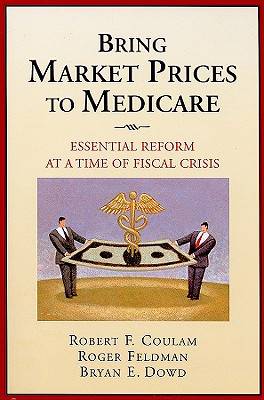
- Afhalen na 1 uur in een winkel met voorraad
- Gratis thuislevering in België vanaf € 30
- Ruim aanbod met 7 miljoen producten
- Afhalen na 1 uur in een winkel met voorraad
- Gratis thuislevering in België vanaf € 30
- Ruim aanbod met 7 miljoen producten
Zoeken
Bring Market Prices to Medicare:
Essential Reform at a Time of Fiscal Crisis
Robert F Coulam, Roger Feldman
€ 27,95
+ 55 punten
Omschrijving
Medicare is quickly approaching insolvency, in part because the program pays too much for the services it provides. In Bring Market Prices to Medicare, Robert F. Coulam, Roger Feldman, and Bryan E. Dowd propose a groundbreaking solution: Use market-based arrangements to set prices for Medicare plans. The authors contend that the federal government should pay only the cost of the most economical health plan in each market area. To accomplish this, both traditional fee-for-service (FFS) Medicare and private Medicare Advantage (MA) would submit bids for the government's business; the federal contribution to premiums would be set to equal the lowest bid in each market area. This competitive pricing system would penalize plans that bid too high-their beneficiaries would pay higher premiums-providing an incentive for plans to offer their best prices. Meanwhile, low-bidding plans would be rewarded with increased enrollment. Such an approach would reduce Medicare spending by 8 percent, shoring up the program's finances while empowering consumers to make sensible choices about their health care. Establishing a competitive pricing system for Medicare will have drawbacks as well: Beneficiaries in some markets would have to pay more to stay in the FFS Medicare plan, while others would lose generous supplementary benefits currently offered by private MA plans in areas where these plans are overpaid. Coulam, Feldman, and Dowd contend that the best way to address public and political opposition to this crucial reform is not to downplay its challenges but rather to consider carefully the needs and expectations of beneficiaries and establish a gradual transition that would alleviate most of the disruption beneficiaries might otherwise experience. Bringing market prices to Medicare is not merely a matter of political strategy or tactics; it will require a fundamental shift in Americans' attitudes toward health care, starting with the realization that Medicare's current payment methods cannot be sustained.
Specificaties
Betrokkenen
- Auteur(s):
- Uitgeverij:
Inhoud
- Aantal bladzijden:
- 166
- Taal:
- Engels
- Reeks:
Eigenschappen
- Productcode (EAN):
- 9780844743219
- Verschijningsdatum:
- 1/12/2009
- Uitvoering:
- Paperback
- Formaat:
- Trade paperback (VS)
- Afmetingen:
- 150 mm x 224 mm
- Gewicht:
- 249 g

Alleen bij Standaard Boekhandel
+ 55 punten op je klantenkaart van Standaard Boekhandel
Beoordelingen
We publiceren alleen reviews die voldoen aan de voorwaarden voor reviews. Bekijk onze voorwaarden voor reviews.











